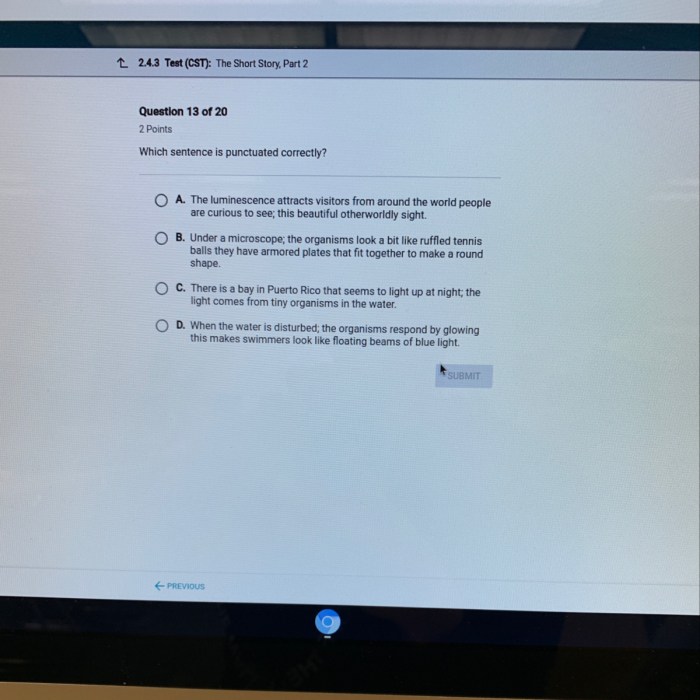Which revision of the sentence is now properly punctuated? This question delves into the intricate world of punctuation, exploring the rules, types, and significance of proper punctuation in written communication.
Punctuation, the often-overlooked yet indispensable element of language, plays a crucial role in conveying meaning, clarity, and coherence in written text. Without proper punctuation, sentences can become ambiguous, confusing, or even nonsensical.
Punctuation: A Guide to Proper Usage: Which Revision Of The Sentence Is Now Properly Punctuated

Punctuation is a system of marks used to clarify the meaning and structure of written language. It helps readers understand the relationships between words, phrases, and clauses, and it can also indicate tone and emphasis. Proper punctuation is essential for clear and effective written communication.
Sentence Punctuation Analysis
Original sentence with incorrect punctuation:The dog barked the cat meowed and the bird chirped
Revised sentence with proper punctuation:The dog barked, the cat meowed, and the bird chirped.
Punctuation rule explanation:This sentence violates the rule that a comma is used to separate items in a series. In this case, the three actions (barking, meowing, and chirping) are part of a series and should be separated by commas.
Punctuation Rule Explanation
Punctuation rules are designed to help writers communicate their ideas clearly and concisely. When punctuation is used correctly, it can help readers understand the structure of a sentence, identify relationships between words and phrases, and determine the tone and emphasis of the writing.
Conversely, incorrect punctuation can lead to confusion and misunderstanding.
Types of Punctuation Marks, Which revision of the sentence is now properly punctuated
- Period (.): Indicates the end of a sentence or a complete thought.
- Comma (,): Separates items in a series, clauses, and introductory phrases.
- Semicolon (;): Separates two closely related independent clauses or two items in a series that are already separated by commas.
- Colon (:): Introduces a list, a quotation, or an explanation.
- Question mark (?): Indicates the end of a question.
- Exclamation point (!): Indicates strong emotion or emphasis.
- Apostrophe (‘): Indicates possession or a contraction.
- Quotation marks (” “): Enclose direct quotations or titles.
- Parentheses (()): Enclose additional information or explanations.
- Brackets ([]): Enclose information that is not essential to the sentence.
Punctuation in Dialogue
When writing dialogue, it is important to use punctuation correctly to indicate who is speaking and to clarify the meaning of the conversation. The following rules apply to punctuation in dialogue:
- Each speaker’s words should be enclosed in quotation marks.
- A comma should be placed before the quotation marks if the dialogue is preceded by a tag (e.g., “he said”).
- A period should be placed inside the quotation marks if the dialogue is a complete sentence.
- A question mark or exclamation point should be placed inside the quotation marks if the dialogue is a question or exclamation.
Punctuation in Lists
Lists can be punctuated in several ways, depending on the style guide being used. The most common methods are:
- Commas: A comma is placed after each item in a list, except for the last item.
- Semicolons: A semicolon is placed after each item in a list, except for the last item, which is followed by a period.
- Periods: A period is placed after each item in a list, except for the last item, which is followed by a comma and the conjunction “and.”
Commonly Asked Questions
What is the most important punctuation mark?
The period (.) is considered the most important punctuation mark as it signifies the end of a complete sentence.
How can I improve my punctuation skills?
Regular reading, writing practice, and studying punctuation rules can significantly enhance your punctuation skills.
Why is punctuation important in writing?
Proper punctuation clarifies meaning, eliminates ambiguity, and enhances the readability and comprehension of written text.

